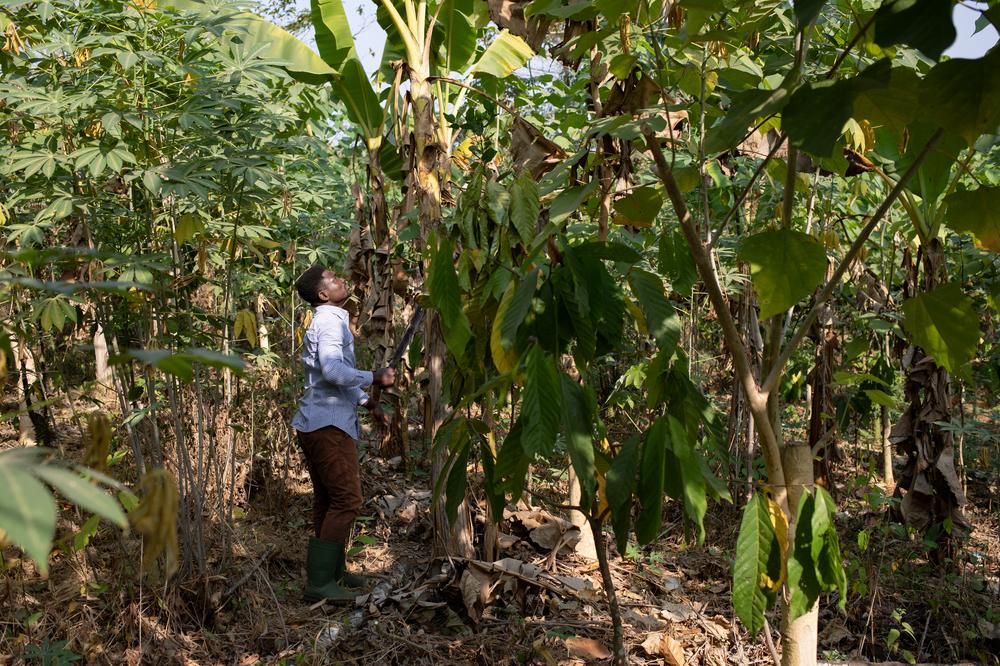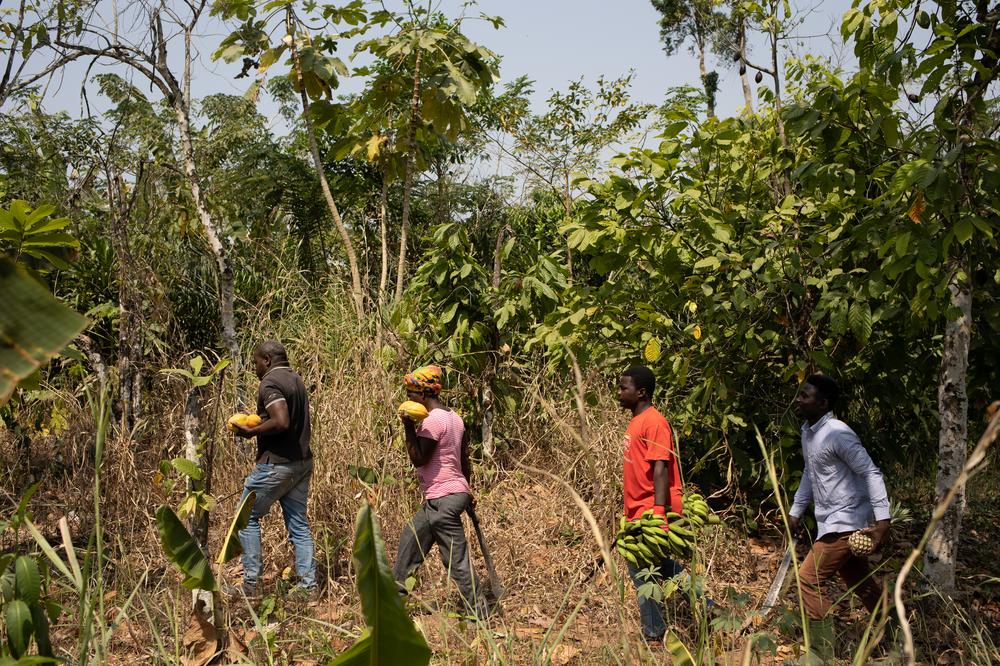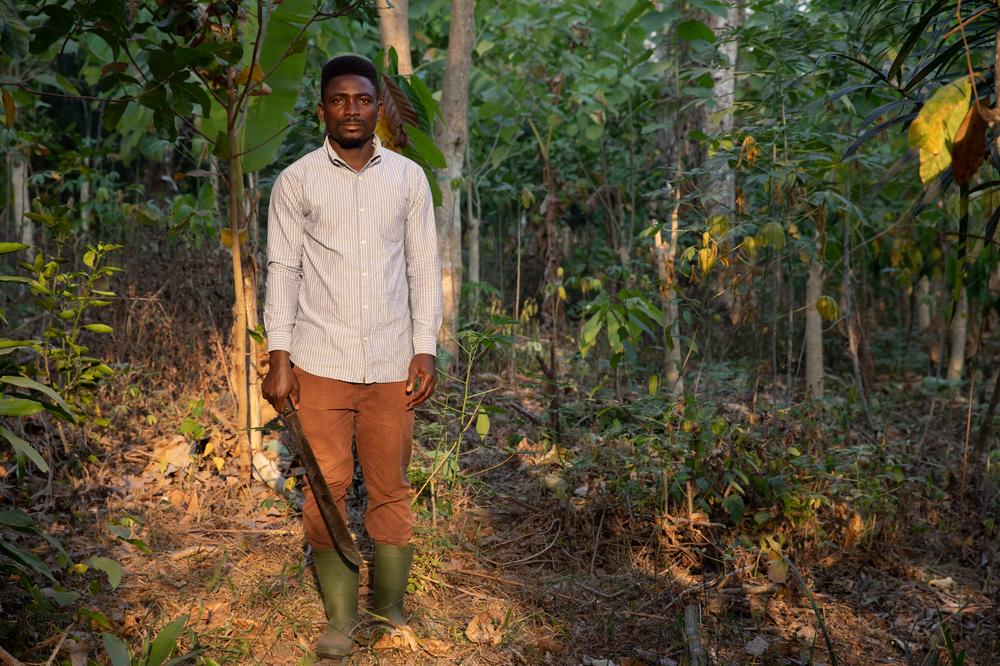Bismark Kpabitey is a Fairtrade cocoa farmer from the Ahafo region of Ghana. He told us about his family, his love of sports, and the impact climate change has on his life.
Can you describe a day in the life of a farmer?
I wake up around 5.30am to get ready for the day.
When I go to the field around 7am it tells me what to do: pruning, field work for about three hours and when it is too hot, I stop.
I go home, eat, listen to music, relax, watch football on TV, then I return as the sun is setting to work for a few more hours.
In the evening I join committee meetings, or play volleyball with my friends. I like sports.
How long have you been farming cocoa?
I started my own farm in around 2017. Before then, I grew up with my parents who were also cocoa farmers. I used to join them when I was on holidays from school and help in the field.
If things don’t change, I don’t think my son will want to be a farmer.
I’m the third generation. My grandfather started it, then my parents and now I’m taking over.
What about the next generation, do you hope they’ll become farmers?
I have a wife and a son, Bastian. I used to want to be one of the greatest farmers in the country. But if things don’t change, I don’t think he will want to be a farmer.
Why if things don’t change – is it difficult to farm?
Very, very difficult. It’s all about this climate issue. When I was a kid and I was helping my parents to farm, every season, we’d get a good yield. And because of cocoa farming I was able to go to school and even to acquire my first degree.
But after that things had become so difficult that my younger siblings… couldn’t continue and decided to find their own jobs.
It is very difficult to go into agriculture because the rainfall pattern has changed.
It is very difficult to go into agriculture because the rainfall pattern has changed. Currently we are experiencing a very hot sun, which is really affecting our crops. For about two months now, we have not experienced any rains. It is so severe that we are losing almost every crop.
In some areas we experienced swollen shoot in the cocoa and we have black pods too. We also have pests, who attack our plants.
Some people are doing logging: it is illegal to cut down trees and has a huge impact on the climate.

And the cocoa is affected?
Yes, cocoa, which is our main crop, is hardest hit. Previously, at the end of the year, you are able to harvest something to get money, to take care of the family, but I can tell you this year will be one of the worst years ever. It’s very worrying, very disturbing – especially for farmers.
Are there things that you can do to mitigate against the damage?
I’m part of a project called Sankofa that is really helping farmers in dynamic agro-forestry. Many organisations have come together to give us training on diversification. This is where you plant different crops in the same field.
Initially we planted only cocoa. Whenever there were prolonged periods of no rainfall, [when] we planted cocoa… you lost about 70-80 percent of the plants. But since this system was introduced to us, we realised it has really improved.
Now we also plant crops like cowpea, mucuna, cocoyam. This makes the soil moist. We have some annual crops like yam, cassava. You can plant about ten or more annual crops in the same piece of land.
We also plant more trees – different varieties of mango, avocado, orange. We add timber and that offsets carbon. Some are for economic use and some are for the protection of the field, during the dry season.
What impact is it having?
If you go there, it’s always cool, the wind there is really comfortable, compared to the conventional system where you had to work in the full sun.
Currently, the issue is we are only a few farmers benefiting from this system. I want this project to extend. And this can only be possible with funding support from additional partners.
How else does being part of Fairtrade help?
The Fairtrade Premium bonuses [have been used] to build infrastructures – like clinics, health centres, water pumps, boreholes, giving us water in areas where we don’t have access to good drinking water.

You did your degree in Business and Human Resource Management, why did you not pursue a job in the city?
I like agriculture. This is one thing that makes me happy, being on the field. I had true motivation.
Do you see yourself as a climate activist?
I am now! After going to COP26 in Glasgow with Fairtrade and seeing how my stories went viral, I realised I have knowledge that I want to share. I can read and write, I try to make others understand.
I give farmers training from what I’ve learned in Sankofa, I want to help others to take some steps.
Photo credits: Fairtrade Africa and Fairtrade Foundation.
Support cocoa farmers like Bismark
The project Bismark is part of, “Alliances for Sankofa” is supported by the Coop Sustainability Fund and Chocolats Halba, the Swiss Platform for Sustainable Cocoa (SWISSCO) and the State Secretariat for Economic Affairs (SECO), the Danish International Development Agency (DANIDA), the International Trade Centre (ITC) and Max Havelaar Foundation Switzerland. It is implemented by ITC together with the Kuapa Kokoo Cooperative Cocoa Farmers and Marketing Union Limited (KKFU) and partners including the Government of Ghana, Fairtrade Africa, WWF Switzerland and the Yam Development Council. Technical support to the project is provided by Ecotop Suisse GmbH, South Pole and the Nature and Development Foundation (NDF).
